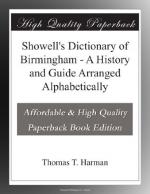Ragg, Rev. Thomas.—Once a bookseller and printer, editor and publisher of the Birmingham Advertiser, and author of several works, one of which secured for him the goodwill of the Bishop of Rochester, who ordained him a minister of the Established Church in 1858. He died December 3rd, 1881, in his 74th year, at Lawley, Salop, having been perpetual curate thereof from 1865. His parishioners and friends subscribed for a memorial window, and a fund of a little over L200 was raised for the benefit of the widow, but a very small part thereof went from Birmingham.
Ratcliffe.—Mr. John Ratcliffe, who had in past years been a Town Commissioner, a Low Bailiff, a Town Councillor, and Alderman, was chosen as Mayor in 1856, and, being popular as well as wealthy, got reappointed yearly until 1859. In the first-named year, H.R.H. the Duke of Cambridge was the Mayor’s guest when he came to open Calthorpe Park. When the Princess Royal was married, in 1858, the Mayor celebrated the auspicious event by giving a dinner to more than a thousand poor people, and he headed the deputation which was sent from here to present England’s royal daughter with some articles of Birmingham manufacture. On the occasion of the Queen’s visit to open Aston Park, Mr. Mayor received the honour of Knighthood, and became Sir John, dying in 1864, in his 67th year.
Rennie, John.—The celebrated engineer and architect, who built Waterloo and Southwark Bridges, Plymouth Breakwater, &c., was for a short time in the employ of Boulton and Watt.
Roebuck, Dr. John, grandfather of the late John Arthur Roebuck, M.D. was born at Sheffield in 1718; came to Birmingham in 1745. He introduced better methods of refining gold and silver, originated more economical styles of manufacturing the chemicals used in trade (especially oil of vitriol), and revived the use of pit coal in smelting iron. After leaving this town he started the Carron Ironworks on the Clyde, and in 1768 joined James Watt in bringing out the latter’s steam engine. Some mining investments failed before the engine was perfected, and his interest thereon was transferred to Mr. Boulton, the doctor dying in 1794 a poor man.
Rogers.—John Rogers, one of “the glorious army of martyrs,” was burnt at Smithfield (London) on February 4, 1555. He was born in Deritend about the year 1500, and assisted in the translation and printing of the Bible into English. He was one of the Prebendaries of St. Paul’s, London, but after Queen Mary came to the throne he gave offence by preaching against idolatry and superstition, and was kept imprisoned for eighteen months prior to condemnation and execution, being the first martyr of the Reformation. He left a wife and eleven children. See “Statues and Memorials.”
Russell.—William Congreve Russell, Esq., J.P., and in 1832 elected M.P. for East Worcestershire, who died Nov. 30, 1850, aged 72, was the last of a family whose seat was at Moor Green for many generations.




